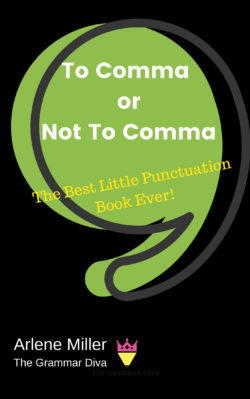It is my pleasure to present this guest post by author and editor Audrey Kalman. See her bio following the post.
By Audrey Kalman
If you’re interested in grammar, you may remember the book Eats Shoots & Leaves. Or you may have heard the phrase “let’s eat Grandma” followed by the admonition that “commas save lives!” Both serve as examples of the necessity of commas to convey meaning. Grammar—or, more specifically, its misuse—can have real consequences.
This may be one reason why some people get so exercised over grammatical errors. I know, because I used to be one of them. I still enjoy a good tussle over use of the Oxford comma. However, as a lifelong writer, my views on grammar have evolved.
I was appropriately rigid as a young writer because everyone told me I had to learn the rules before I could break them. I rebelled in early adulthood, thinking—if not always saying—who are you to tell me I have to follow the rules?
Now I’ve settled into a more harmonious relationship with grammar and wordsmithing. I’m less afraid to push the boundaries or break the rules in service of a greater good, such as maintaining the voice of a character or supporting the style of a piece. When I feel uncertain about usage or sentence structure, I consult experts such as The Chicago Manual of Style, The AP Style Guide, or Arlene Miller.
In general, I leave the grammar rules to the grammarians. But over the years I have come up with a few guiding principles for writers of any kind—whether novelists, memoirists, or casual emailers.
1) Be humble. Be prepared to question yourself and listen to what others say about your writing—grammar and style included. This is not the same as blindly accepting criticism. On a grammatical issue, if someone says you’re wrong and you believe you’re right, go to a neutral third party for arbitration. If the criticism involves a matter of personal taste rather than something that can be resolved by objective analysis, then follow your heart and your voice. For example, I’ve had my fiction criticized as “wordy.” I listened, reviewed the criticized pieces, and in some cases decided that I was content with them as written. Shakespeare, William Faulkner, and Thomas Wolfe were wordy too. Readers who want Hemingway should read Hemingway, not criticize non-Hemingways for not being Hemingway.
2) Be yourself. Too many people try to make themselves sound the way they think they ought to sound. In the process, they end up sounding stilted, artificial, and often simply unreadable. One of the hardest things to do is find your voice as a writer, which you won’t do by making yourself sound like someone else.
3) Read and imitate. Wait—didn’t I just say you can’t find your voice by imitation? True. You can, however, learn to write well by imitating. I didn’t learn to write by taking a class. I learned by plagiarizing my favorite childhood novels. Eventually I stopped imitating other writers and started becoming confident in the way I wrote. Similarly, I didn’t learn grammar by diagramming sentences, but rather by reading lots and lots of well-written sentences. The one drawback to this method—which I think of as “natural grammar acquisition”—is that even now, as a professional editor, I sometimes have no idea why something is right. Then I scurry to the experts to find the rules supporting my intuitions.
4) Know thy audience. Once upon a time, in my rigid writing days, I would have been horrified by texting and emojis. Even now, I use punctuation and complete words in most of my texts, which makes my kids laugh. Still, I appreciate the evolution of language. Language is living and it should be joyful. Of course, that doesn’t mean using emojis in journal articles or LOLing in term papers. Thus the dictum know your audience. As with all social constructs, you’ll do better if you know the basic rules of grammar and style and understand where, when, and how it’s appropriate to break them.
So there you have my four principles. Take ‘em or leave ‘em. Follow ‘em or break ‘em. The one thing I can promise if you decide to break them is that the consequences won’t be as dire as cannibalism perpetrated against your relatives.
Bio
 Audrey Kalman writes literary fiction with a dark edge, often about what goes awry when human connection is missing from our lives. She is the author of two novels—What Remains Unsaid and Dance of Souls—and a forthcoming book of short stories, all available on Amazon. Her short fiction and poetry have appeared in a number of print and online journals, and she is at work on another novel. Connect on Twitter, Facebook, or via her website.
Audrey Kalman writes literary fiction with a dark edge, often about what goes awry when human connection is missing from our lives. She is the author of two novels—What Remains Unsaid and Dance of Souls—and a forthcoming book of short stories, all available on Amazon. Her short fiction and poetry have appeared in a number of print and online journals, and she is at work on another novel. Connect on Twitter, Facebook, or via her website.
Grammar Diva News
(Temporary cover only)
My new book, To Comma or Not To Comma will be out later this summer (I am hoping August). It will likely be available for preorder on Kindle.
Spoke to a class of would-be entrepreneurs in their teens at the SBDC (Small Business Development Center) Boot Camp about the importance of good writing skills for anyone who wants to start a business. I will be speaking to another such group this coming week at College of Marin.




Touching on the idea that story is not construction and grammar, but experience and insight reflected in compelling terms. I like that. Congrats to her.
True. As an editor, I’ve had the experience of being so captivated by a story that I hardly notice grammatical errors. It’s much easier to repair grammar than to give a story a heart it doesn’t have. –Audrey
Excellent post. I agree with all of it.
Thank you, although there’s room for disagreement in the world of grammar. –Audrey
Illuminating. What a consolation to find I don’t have to correct my texts. Still giggling over that. Not really sure I can stop….
Glad to have been illuminating and to have contributed some laughter to your day! — Audrey